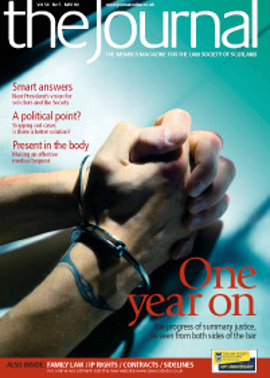Where fact makes law

Since the coming into force of the Family Law (Scotland) Act 2006, Scots law has allowed ex-cohabitants to make financial claims against each other when they split up (2006 Act, s 28). Before being able to do so, however, the pursuer has to establish that he or she was indeed a “cohabitant” as defined in s 25. Early indications suggest that this will be a matter that is strenuously disputed in many cases. Other countries have been facing the same problem for rather longer than Scotland, and foreign jurisprudence can be of some assistance.
Having recently spent the (northern) winter months in the balmy, if windy, environs of Wellington, New Zealand, I was interested to discover how the issue is approached by the New Zealand courts. Few countries in the world have gone quite so far as New Zealand in equating the position of cohabitants with those of married/civilly empartnered couples, for the view is taken there that the needs of the parties, and the justice of claims, do not depend on the legal form the relationship takes.
In relation to financial provision on separation (and in most other areas), the claims arising from what are called in New Zealand “de facto relationships” are identical to the claims arising from marriage/civil partnership. This of course is not so in Scotland, but the preliminary question in both jurisdictions is the same: does the relationship satisfy the relevant definition?
“De facto relationships” defined
Since amendments in 2001, New Zealand’s Property (Relationships) Act 1976 has allowed a party to any of three types of relationship – marriage, civil union, or de facto relationship – to seek financial readjustment when the relationship breaks down. This basically takes the form of an equal division (subject to certain qualifications) of “relationship property”, which is defined rather more broadly than “matrimonial/ partnership property” in Scotland.
The definition of “de facto relationship” for the purposes of this Act is found in s 2D: it is a relationship between two persons, both of whom are over 18 and who are not married/civilly empartnered to each other, but who “live together as a couple”. (Whenever a party is under 18 it would seem that the couple are only de facto a de facto couple but not de iure a de facto couple.)
Section 2D(2) provides that in determining whether two persons live together as a couple, the court must take into account all the circumstances of the relationship, including various specified factors, such as:
- the duration of the relationship;
- the nature and extent of the common residence;
- whether or not the relationship was sexual;
- the degree of financial dependence or interdependence;
- the ownership, use and acquisition of property;
- the degree of mutual commitment to a shared life;
- the care and support of children;
- the performance of household duties;
- and the reputation and public aspects of the relationship.
This list is not exhaustive. It serves a similar function to the far shorter list of factors in s 25(2) of our own 2006 Act. The length of the relationship and the financial arrangements between the parties appear in both lists (though worded differently), and the other element mentioned in s 25(2), “the nature of the relationship”, must (if it is not to be tautologous of the very question at issue) allow the Scottish court to take account of any other factor relevant to determining the issue, such as any of the factors listed in the New Zealand legislation.
Colouring in
The New Zealand courts frequently emphasise that none of the listed factors is on its own determinative one way or the other, and all the factors are taken into account to provide an overall “colour”. This allows a certain flexibility, which is sometimes used to ensure that justice is done.
In RPD v FNM [2006] NZFLR 573, a woman had three children by the man she lived with. She earned her living through prostitution, and the man “earned” his by pimping for her. She saved her money; he did not. The judge found that their financial interdependence fell within the context of a business relationship, that their personal relationship was characterised by the man taking a great deal and contributing little in return, that there was a lack of commitment on both sides, and that their relationship was not public but on the contrary was “obscured from public view”. When the man claimed a share of the woman’s savings, the court refused to hold the parties to be in a de facto relationship, but rather that they were in a parasitic business relationship (even although a de facto relationship was established at a later period, in respect of which the man could claim little).
Sexual activity between the parties is relevant, but not crucial, and it is clear that in New Zealand the complete absence of any sexual element to the relationship would not preclude the finding that the couple were in a de facto relationship. This is unlikely to be so in Scotland, where “living together as if they were husband and wife” may well imply a sexual element at least at the start of the relationship. (Civil partners are – legally speaking – entirely non-sexual and so it might well be argued that “living together as if they were civil partners” does not require any sexual element.) Conversely, in neither Scotland nor New Zealand will the fact that the couple have sexual partners outwith the relationship negate a de facto relationship that otherwise exists: Scragg v Scott [2006] NZFLR 1076.
Property and perception
The use and ownership of property was also discussed in Scragg. The couple had a sexual and social relationship but they lived apart – indeed for the most part they lived in different countries. However, they visited each other, often for periods of many months, and when they did so they always lived in the other’s house. Also, the man had purchased the woman’s house for her. The High Court held that the parties had “lived together as a couple” and therefore were in a de facto relationship for the purposes of the 1976 Act.
On the other hand, in RRB v GF (25 June 2008, New Zealand Family Court) a claim was made by a woman against the man who had bought a house for her and her children, who socialised with her, had sexual relations with her and spent many nights (and holidays) with her and her children, but who kept his own clothes and other personal possessions at his parents’ house – and slept there, with a hotly disputed level of frequency. The court held that while the woman’s house was used for various “joint activities”, it was never a common residence because the man never saw it as his home, and so the couple were not a de facto couple.
Subjective perception by the parties plays an important role in New Zealand, for there is a mental element to the existence or otherwise of de facto relationships. This is seen most clearly with another factor specified in the s 2D(2) list: the degree of mutual commitment to a shared life. In PZ v JC [2006] NZFLR 97 a student aged 41 started out as the lodger of a 78-year-old, but the relationship developed into “an affectionate, mutually supportive and close relationship in certain domestic areas of their life, including, it seems, sexual contact”. However, there was no clear indication that the 78-year-old was committing himself to a “couple-relationship” instead of a landlord-lodger relationship, and the claimant failed in her attempt to persuade the court that a de facto relationship existed. It will be interesting to see whether a subjective mental element is considered necessary in Scotland.
Conclusions on the facts
In Scragg the High Court warned that the variety of forms that personal relationships can take is so great that each case must be dealt with on its own facts and none may be regarded as setting a precedent. It also emphasised that the concept of “living together as a couple in a de facto relationship” was chosen by the New Zealand Parliament explicitly to bring in more relationships than would be caught in a formulation such as “living together in a relationship in the nature of marriage”, the formula used in Scotland. This suggests that de facto relationships might be found to exist in New Zealand when, on identical facts, a cohabiting relationship would not be found in Scotland. For this reason the cases discussed above need to be read with care before attempting to apply analogous reasoning in claims before the Scottish courts. I hope that they are, nevertheless, of some interest to family practitioners here. In any case, everyone should visit New Zealand.
In this issue
- Obama's first 100 days
- Playing politics with the Scottish constitution
- Beneficiaries are suffering from the high cost of advice
- Ever forwards
- Shared principles
- A year of debate
- Ask the audience
- Property sales continue to fall
- Where fact makes law
- Giving up the body
- Playing politics with the constitution
- Matrix evolutions
- Make it happen
- View from the top
- Retiring thoughts
- Law reform update
- Phone a friend
- Lighting the way
- Is Big Brother watching too closely?
- Ask Ash
- Selection, the professional way
- A claims pandemic?
- Bumper crop
- A place in the sun?
- Equality redefined
- Taking diligence forward
- Scottish Solicitors' Discipline Tribunal
- Book reviews
- Website review






